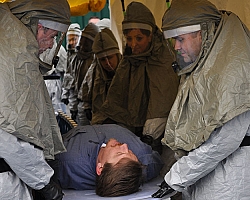Twenty soldiers and civilian volunteers from Madigan Army Medical Center completed In Place Patient Decontamination (IPPD) training on Wednesday morning in a designated area adjacent to the hospital's emergency room.
The three-day training, facilitated by Dave Nelson from Advanced Technical Education Consultants, prepared participants in how to identify hazardous materials such as nerve agents and radioactive materials; how to protect themselves in the event of exposure; how to don specialized hazardous material gear and equipment quickly and efficiently; and how to safely decontaminate victims prior to their entering the hospital for medical assistance, said MAMC Emergency Management Coordinator Joseph Weston.
The training is "to protect the hospital from being contaminated," he said, noting that all hospitals in the region are similarly trained.
During Wednesday's exercise, participants practiced donning gear, setting up a decontamination shelter and hazardous material containment area and decontaminating volunteer "victims."
In the event of a real emergency, IPPD set up should take about eight minutes, Weston said, with the unit fully operational in 20 minutes. Last week, another group of 20 completed the training, so MAMC now has 40 IPPD-trained personnel on hand.
The decontamination shelter features separate areas for males, females, and stretchers, each with four stations. Victims (who are first screened for chemical contamination) doff their clothing, shower, rinse and are again screened for contamination before being allowed to enter the hospital triage area for care. For ambulatory patients, the process should take less than five minutes, Weston said
Unconscious patients, who roll through a center section of the tent on a stretcher, should be clean in about 10 minutes. Trained personnel can screen and clean about 200 patients per hour, Weston said.
Though Wednesday's training was a "dry run," the IPPD team will complete wet training in March.







Read Comments